For artists, creators, and small business owners, choosing between Big Cartel vs Etsy can be tricky. You’re likely balancing a tight budget, limited time, and the need for a platform that supports your creative work and gets your products noticed. So, which one is the better fit for your business?
In this article, we’ll take a closer look at Etsy and Big Cartel to help you confidently decide on the right platform for your business. Here are the aspects that we will compare:
So what are you waiting for? Join us to see which platform wins!
Big Cartel vs Etsy: Quick Summary
Big Cartel and Etsy are both built with creators in mind, but they approach online selling differently. To really understand what sets them apart, let’s start by exploring what each platform is all about!
An introduction to Big Cartel
Big Cartel is a hosted eCommerce platform designed for artists and independent creators who want to sell their work online. It offers a straightforward way to create an online store, giving you full control over your brand’s look and feel. With Big Cartel, you can freely customize your store using templates, manage inventory, and handle orders – all without being tied to a marketplace ecosystem.
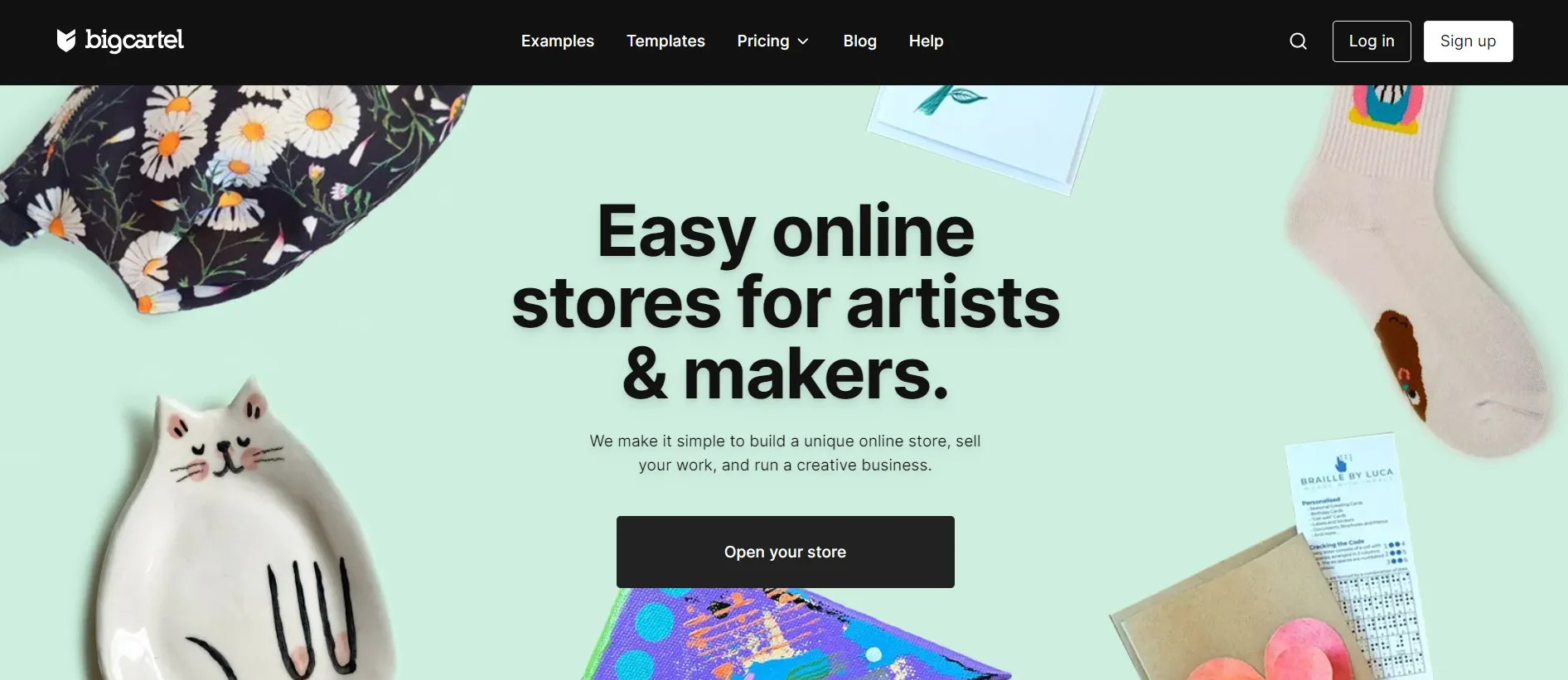
According to BuiltWith, nearly 60,000 live websites currently use Big Cartel to sell products. This number reflects its niche appeal among creators seeking autonomy and a unique online presence.
Big Cartel pros | Big Cartel cons |
|
|
An introduction to Etsy
Next, let’s turn to Etsy – a bustling marketplace that’s been a favorite for handmade and vintage goods! From handmade crafts to vintage treasures, Etsy’s focus is on connecting artisans and buyers in a single marketplace. If you want instant access to an engaged audience, Etsy could be the right pick.
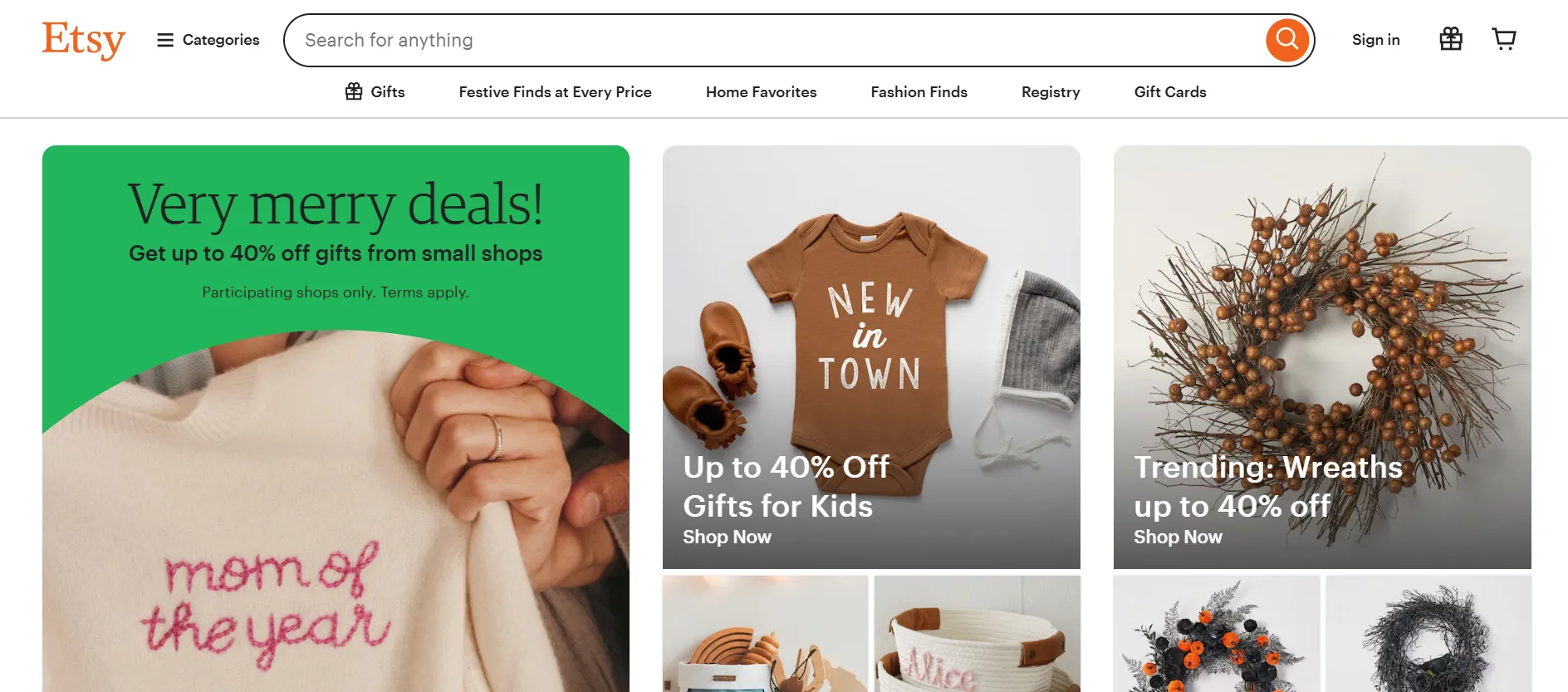
As of now, data reveals that there are over 9 million active sellers on Etsy. This massive scale highlights its popularity among creators and its ability to attract shoppers.
Etsy pros | Etsy cons |
|
|
Big Cartel vs Etsy: Which is Better?
Based on the overview of Big Cartel vs Etsy, we have conducted a list of business types that we think will be most suitable for Etsy vs Big Cartel.
Big Cartel works best for:
- Independent artists, designers, or creatives looking for a simple, customizable online store.
- Small businesses selling handmade or limited-edition items.
- Businesses with minimal product inventory want to establish their own brand identity.
- Entrepreneurs seeking a low-cost platform with basic eCommerce features.
Etsy is a better fit for:
- Businesses focused on selling handmade, vintage (20+ years old), or craft supplies.
- Creatives targeting a built-in marketplace with high traffic and niche audiences.
- Sellers who prefer a community-oriented platform with tools to promote their products.
- Entrepreneurs who value ease of setup and minimal technical know-how.
We’ve introduced both platforms and explored their strengths. It’s time to take a closer look at the detailed comparison of Big Cartel vs Etsy, starting with pricing and fees!
Seamlessly migrate your store to a more robust place!
LitExtension can safely transfer your data to unlock more growth on the new platform.
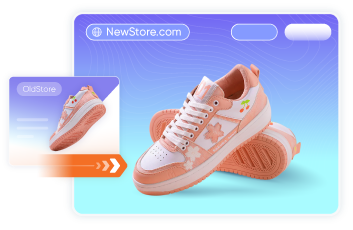
Pricing & Fees (Big Cartel Wins)
These two platforms of Big Cartel vs Etsy have their own ways of charging sellers, so let’s break them down to help you decide which one aligns with your budget and selling style.
Big Cartel pricing
Big Cartel keeps it simple with three straightforward plans, making it a great choice for smaller businesses or those seeking ease and affordability. Unlike other platforms, Big Cartel divides its plan based on the number of products you sell. More specifically:
- Free: $0/month (5 products)
- Platinum: $15/month (50 products)
- Diamond: $30/month (500 products)
While these licensing fees are a great starting point, keep in mind that there are additional Big Cartel costs to consider, such as:
- Domain name: $10 – $20/year;
- Website design (optional): $3,000 – $10,000 (one-time payment);
- Apps and tools: $0 – $40/app/month;
- Payment processing fee: 2.9% + $0.30 per transaction;
- Marketing fees: $100 – $10,000+, depending on your budget and channels.
All things considered, you should prepare yourself to pay about $50 – $100/month on average to maintain your Big Cartel website.
Etsy pricing
Meanwhile, Etsy has a more layered pricing structure. You can start with the free plan or opt for Etsy Plus at $10/month. Besides the subscription fee, you still have to be aware of these extra fees:
- Listing fee: $0.20 per listing (pay-as-you-go);
- Transaction fee: 6.5% on sold items (including shipping costs);
- Payment processing fee: 3% + $0.25 per transaction;
- Advertising fee: 12% – 15% for offsite ads, depending on your annual revenue.
In sum, running an Etsy store may cost you at least $100 – $300/month. This is primarily due to Etsy’s listing and transaction fees, which can add up quickly with every sale.
However, maintaining it can become more expensive than expected as these fees accumulate, especially for sellers with a high volume of transactions.
The Verdict
Both platforms are cost-effective, but Big Cartel takes the win here. Etsy’s extra fees, such as transaction and advertising charges, can quickly add up, making it the more expensive option.
Ease of Use (A Tie)
With pricing out of the way, it's time to focus on how easy these platforms are to use. After all, no matter how affordable a platform is, it needs to be simple enough for you to manage effectively. Let’s see how Big Cartel and Etsy compare in this area.
Big Cartel ease of use
Big Cartel is clearly trying its best to deliver an easy-to-use experience for all merchants. This is shown through the straightforward setup process and minimalist dashboard design.
Getting started is easy enough: choose a plan, sign up with basic information like your email and shop name, and you’re ready to begin. If you’re on a paid plan, you will need to add billing info for extra.
After that, you must complete the Big Cartel setup guide to access the full dashboard. It might feel like a detour, but we actually found it helpful. The guide ensures you’ve set up essential details like your store’s branding and product listings, which saves time and avoids potential mistakes later on.
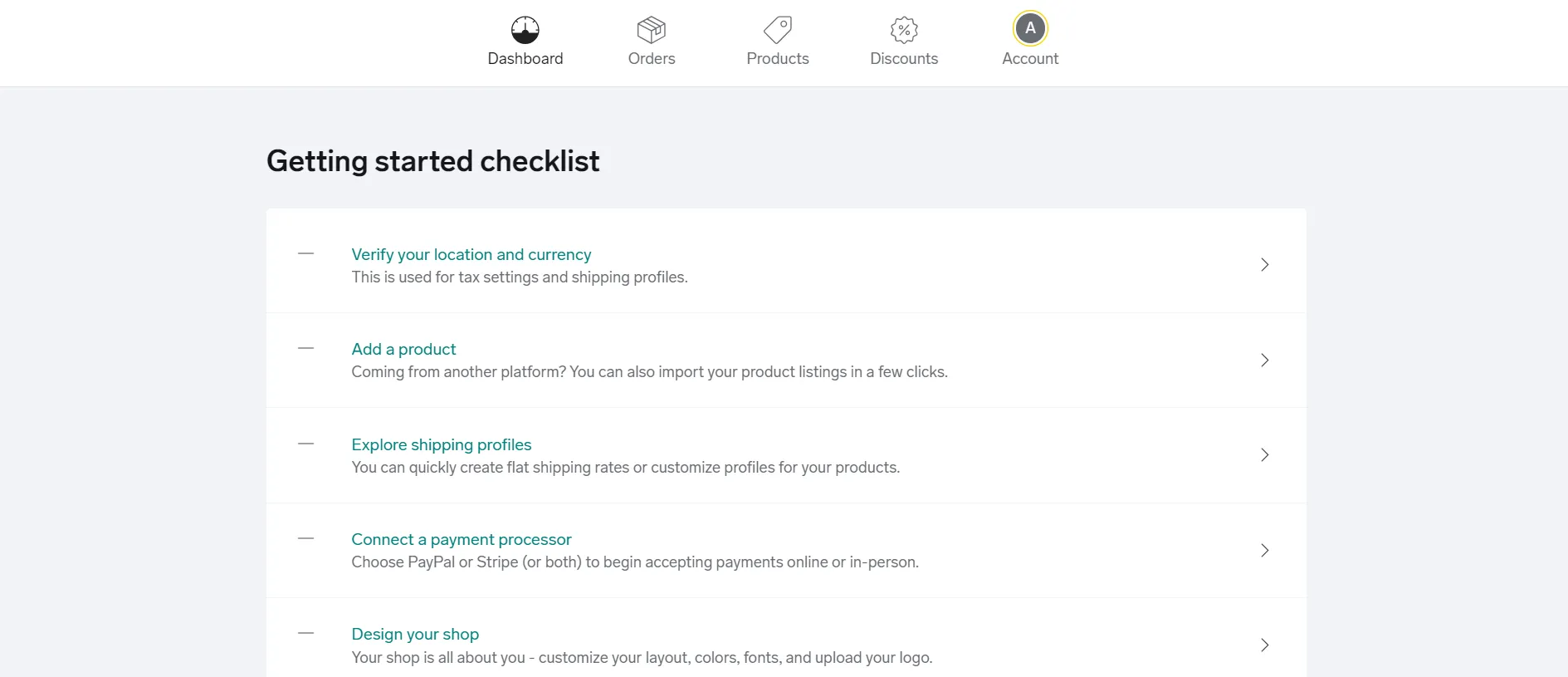
Once completed, the dashboard opens up with five main sections: Dashboard, Orders, Products, Discounts, and Account. This means you don’t need to spend much time figuring out the features available. Plus, managing your store data becomes much easier, making it clean, easy to navigate, and free of unnecessary clutter.
Etsy ease of use
Similarly, Etsy is also designed with user-friendliness in mind. From the moment you sign up, it guides you through a simple process to set up your shop name, list your first product, and start selling.
Entering the Etsy Shop Manager dashboard, which is quite well-organized, just like most platforms. Its clear navigation menu and categorized sections ensure that tasks like managing listings, checking orders, etc., are straightforward. From the homepage, you can already catch up with key store statistics, helping you stay on top of your shop’s performance right away.
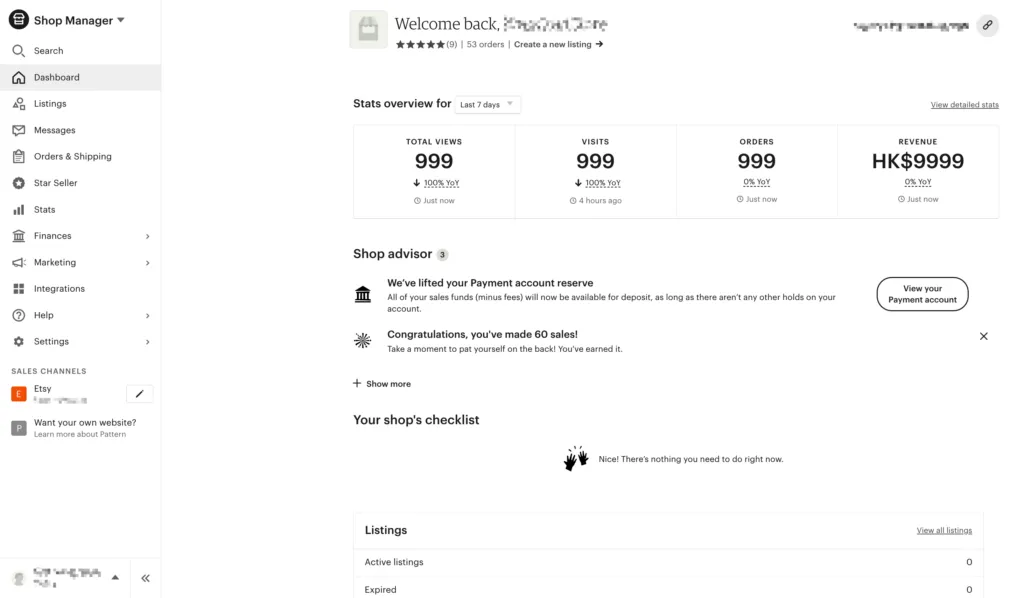
The Verdict
It’s a tie! Both Big Cartel vs Etsy are great options for eCommerce starters. Thanks to their user-friendliness, you can rest assured that you can easily set up your store in the shortest time possible.
Design & Customization (Big Cartel Wins)
Ease of use is important, but it’s just one piece of the puzzle. Design and customization can make or break how your store reflects your brand’s personality. So, how do Big Cartel vs Etsy compare in giving you the tools to create a store that truly feels like your own?
Big Cartel customization
To start with, Big Cartel offers over 15 free templates to get your store started. These templates are all mobile-responsive, ensuring your shop looks great on any device.
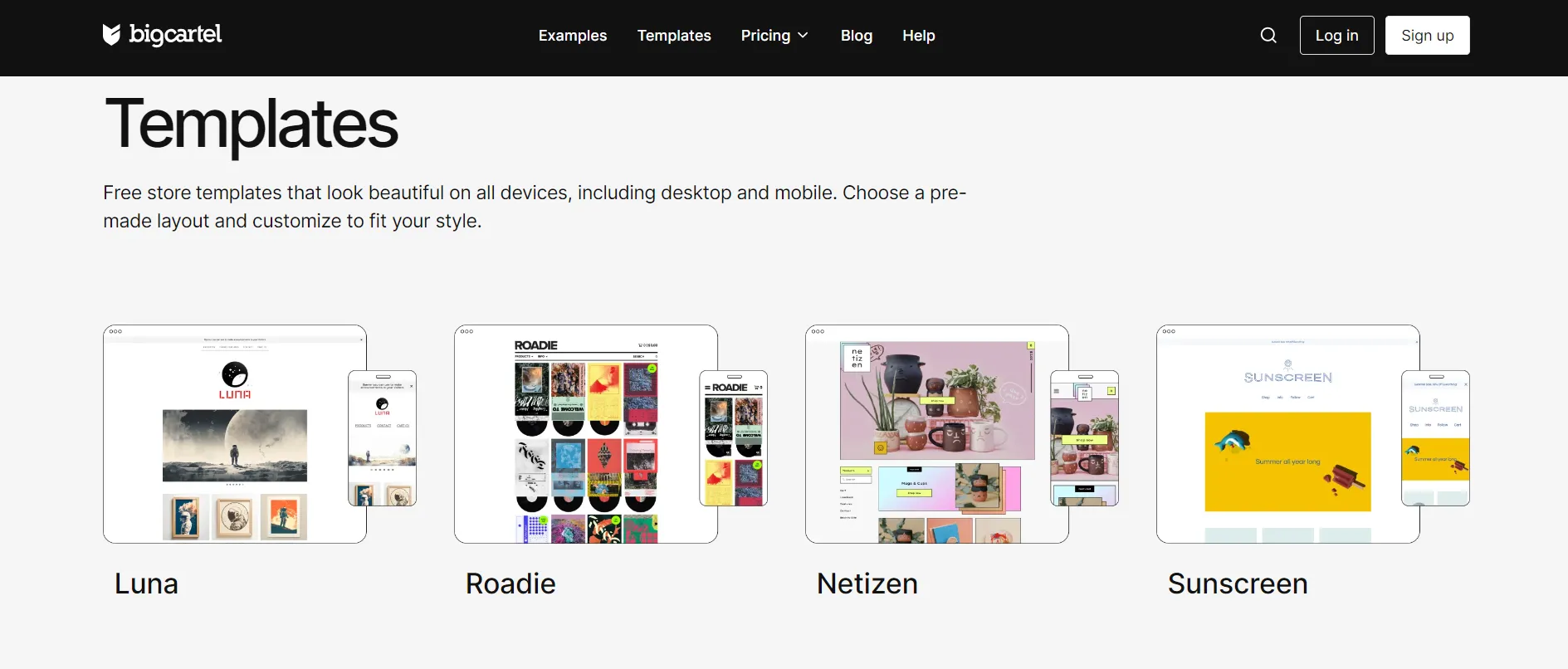
Big Cartel’s customization tools are quite basic compared to other eCommerce platforms. On the free plan, your options are minimal—you can upload images to specific pre-defined sections of your website, but you won’t have the ability to adjust layouts or colors. It’s a functional starting point but not ideal if you want more creative control.
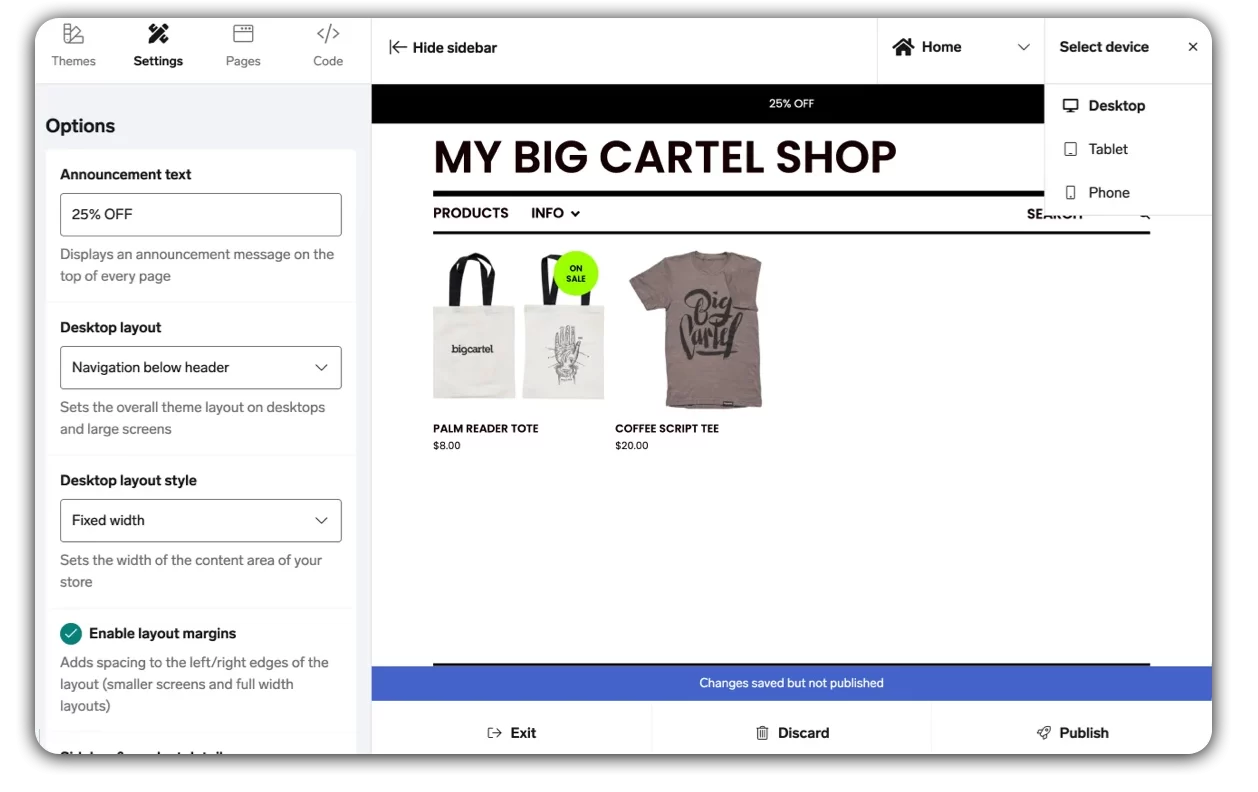
Upgrading to a paid plan unlocks additional customization features, including tools to tweak colors, fonts, and images. You also gain access to the code editor, which allows for deeper customization if you’re familiar with HTML, CSS, and Liquid Markup. This opens up possibilities to modify your theme and tailor it to your brand. That said, some parts of your store, like the checkout pages, remain fixed and cannot be altered, which might be limiting for those seeking full design freedom.
Etsy customization
Etsy is even more limited than Big Cartel when it comes to customization. There are no templates to even start with since all Etsy stores follow the same established layout and aesthetic. Your customization options are restricted to updating your store name, logo, product images, and descriptions.
While this uniformity ensures a consistent look and feel across the platform, it doesn’t allow sellers to create a distinctive brand identity. You can upgrade to their premium plan anytime, yet the only added value for customization here is adding your own banner.
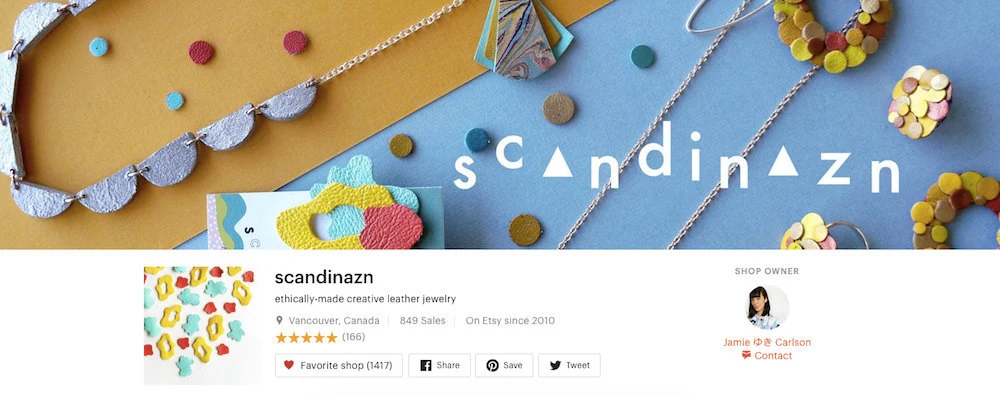
The Verdict
Big Cartel takes the win here. Even though its customization tools are basic, it still gives you more creative control compared to Etsy’s one-size-fits-all design.
eCommerce Features (Etsy Wins)
Since you’re already searching for the best platform to support your selling journey, the eCommerce features are something you can’t afford to overlook. In this section, we’ll break down how Big Cartel vs Etsy compare across these key areas:
Product type supported
When it comes to product types, Big Cartel sticks to physical goods. If you want to sell digital items (digital templates, eBooks, photos, etc.), you’ll have to rely on third-party apps, which adds a layer of complexity that may not suit every seller. This can be limiting for those looking to expand into digital products without additional effort.
Meanwhile, Etsy makes things easier by supporting both physical and digital products right out of the box. This built-in feature gives sellers the flexibility to expand their offerings effortlessly, helping them reach a wider audience and diversify their product lineup.
Inventory management
You can quickly add products by filling in just a few sections, keeping the process fast and simple. Nevertheless, you can’t manually create orders, which means sellers have to rely on alternative methods for custom orders – potentially adding extra time and increasing the risk of errors during the process.
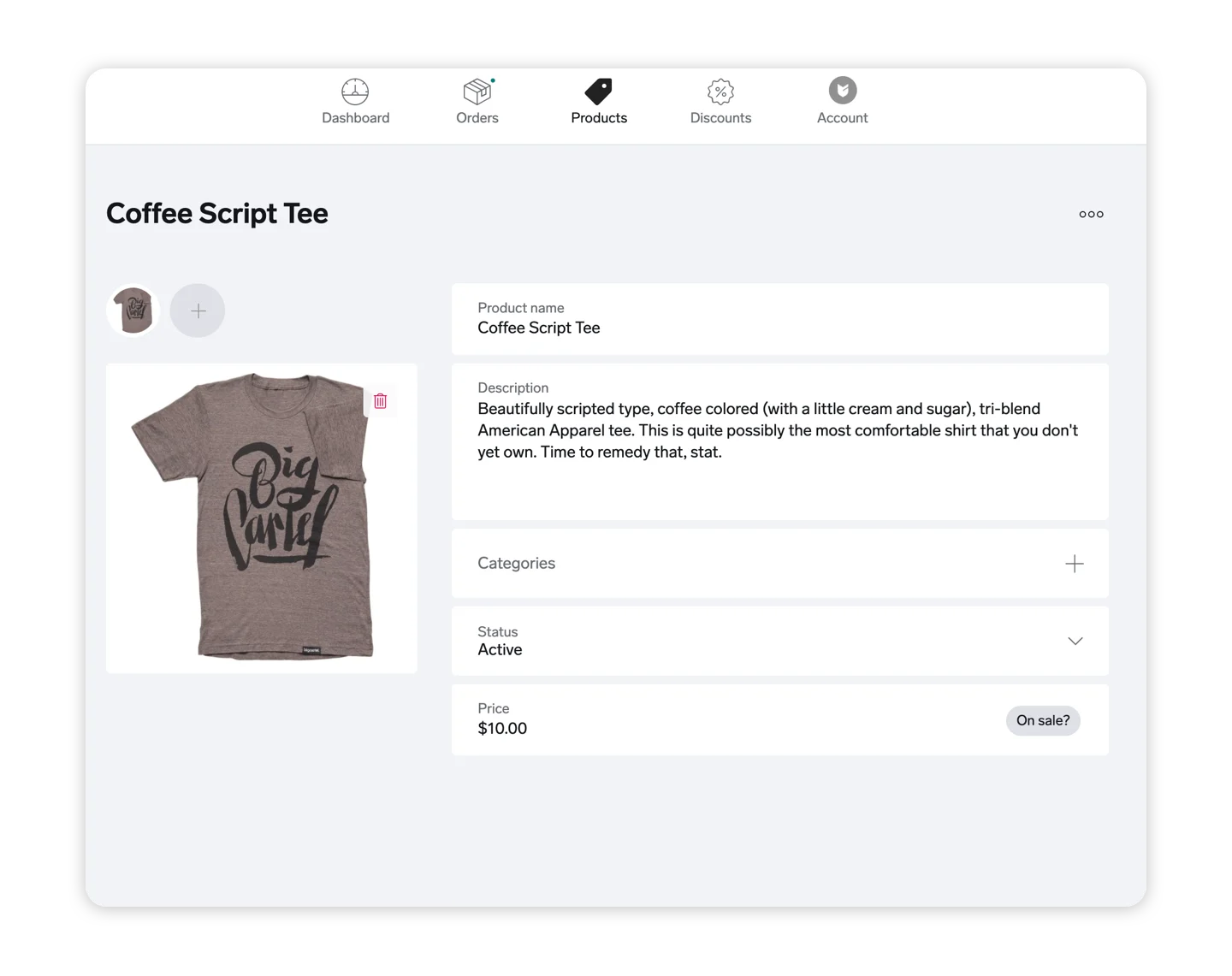
At the same time, adding products on Etsy is just as smooth and intuitive. You can upload photos, add descriptions, and include tags to boost product visibility. For sellers offering personalized or made-to-order products, Etsy simplifies things by tracking customization requests directly on the order page. The only limitation here is the absence of a bulk upload option, which can be time-consuming for sellers with larger catalogs.
Statistics tracking
With Big Cartel, you get basic performance analytics like total sales, product performance, and traffic sources. It’s enough to cover the essentials, but if you need more advanced reporting or deeper insights, you’ll have to rely on third-party tools.
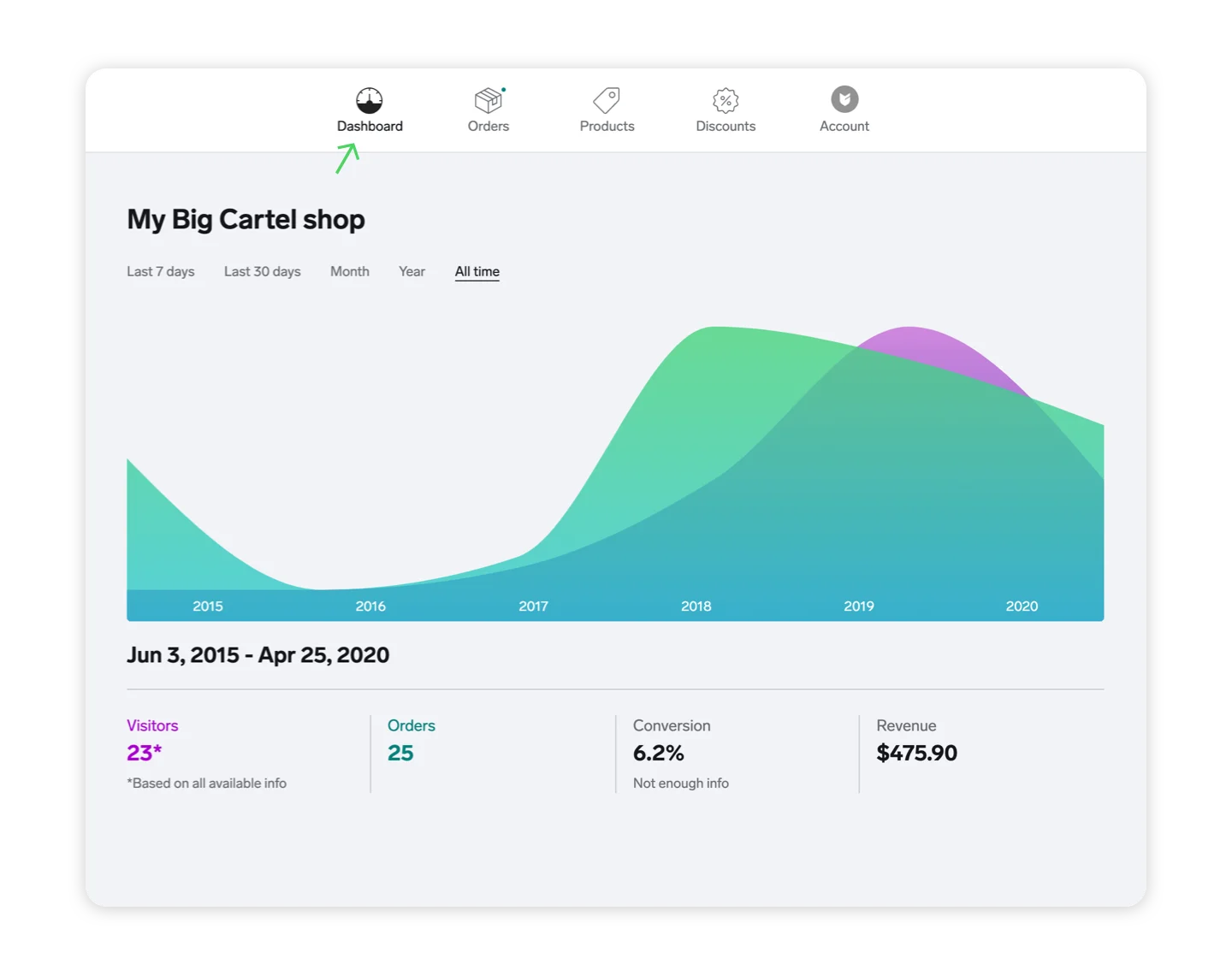
In comparison, Etsy delivers stronger built-in stats. Besides an overview of your orders, visitors, and conversion rate, the platform provides valuable insights into buyer behavior. More specifically, you can track where customers are coming from, which items they’ve favorited, and who has followed your shop. This level of detail helps sellers refine their strategies and connect more effectively with their audience.
Shipping & Fulfillment
Big Cartel’s shipping tools include free shipping, flat rates, and in-store pickup. With shipping profiles currently in beta mode, you can save default settings to streamline the process for new product listings, keeping things simple and efficient.
With Etsy, you are offered a robust Shipping Labels feature, which prints discounted labels for USPS, FedEx, and Canada Post, saving you up to 30% on shipping costs. For sellers handling multiple items, the Shipping Profile Bulk Editor is a handy addition that saves time and effort.
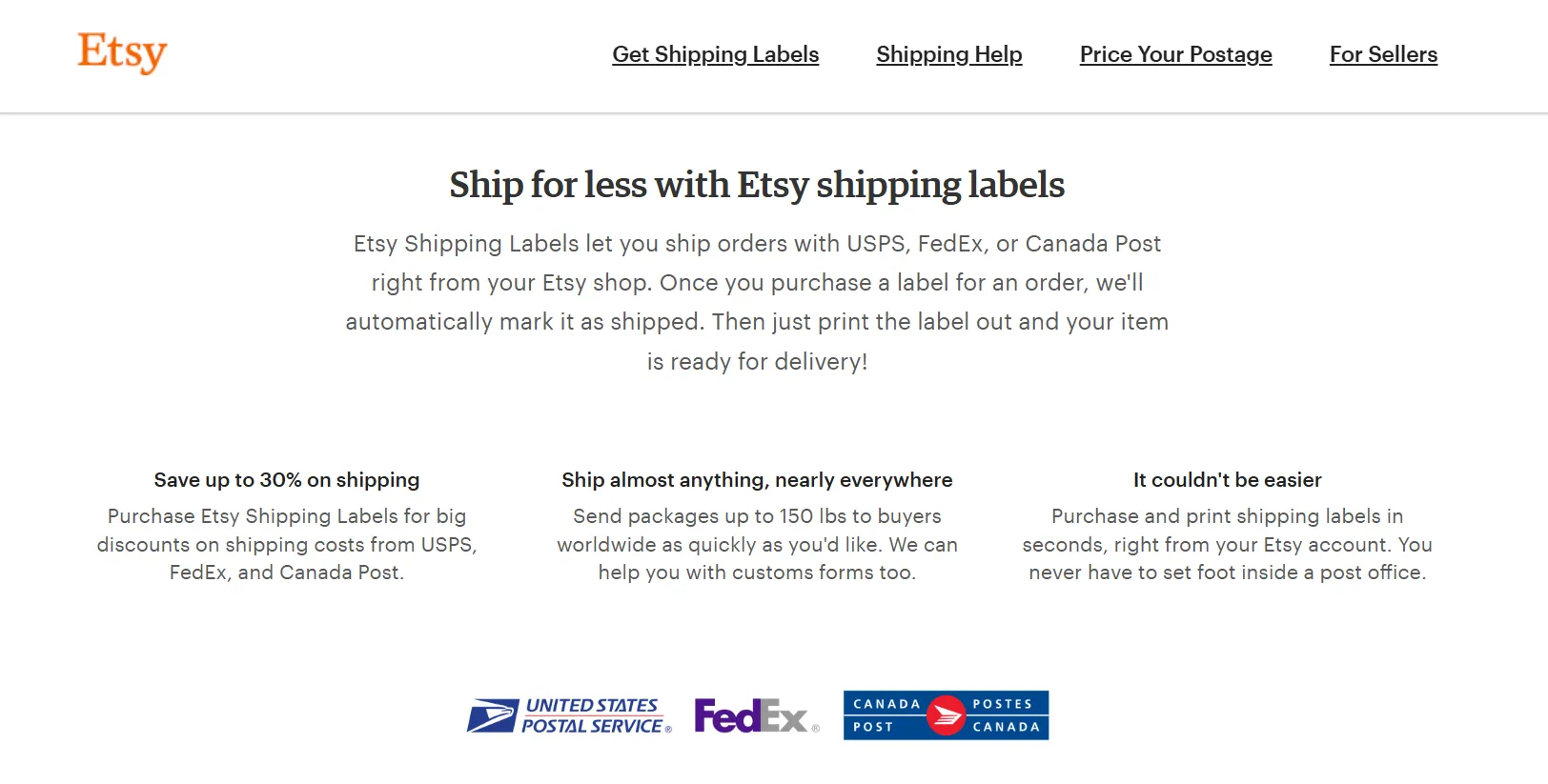
The Verdict
Etsy comes out ahead when it comes to eCommerce features between Big Cartel vs Etsy. With built-in support for digital products, advanced analytics, and discounted shipping labels, Etsy makes running your store more efficient and streamlined.
Marketing & Blogging (Etsy Wins)
Having a well-designed store is essential, but it’s just as important to attract and engage your audience. This article will continue by examining how Big Cartel vs Etsy compare in terms of marketing tools and blogging capabilities.
Big Cartel marketing features
Big Cartel lets you create discount codes and run promotions, but it lacks built-in tools for advanced marketing features like email campaigns, social media management, or abandoned cart recovery. If you need these capabilities, integrating apps like MailChimp, Omnisend, or Privy can bridge the gap, but it does require extra effort for manual setup.
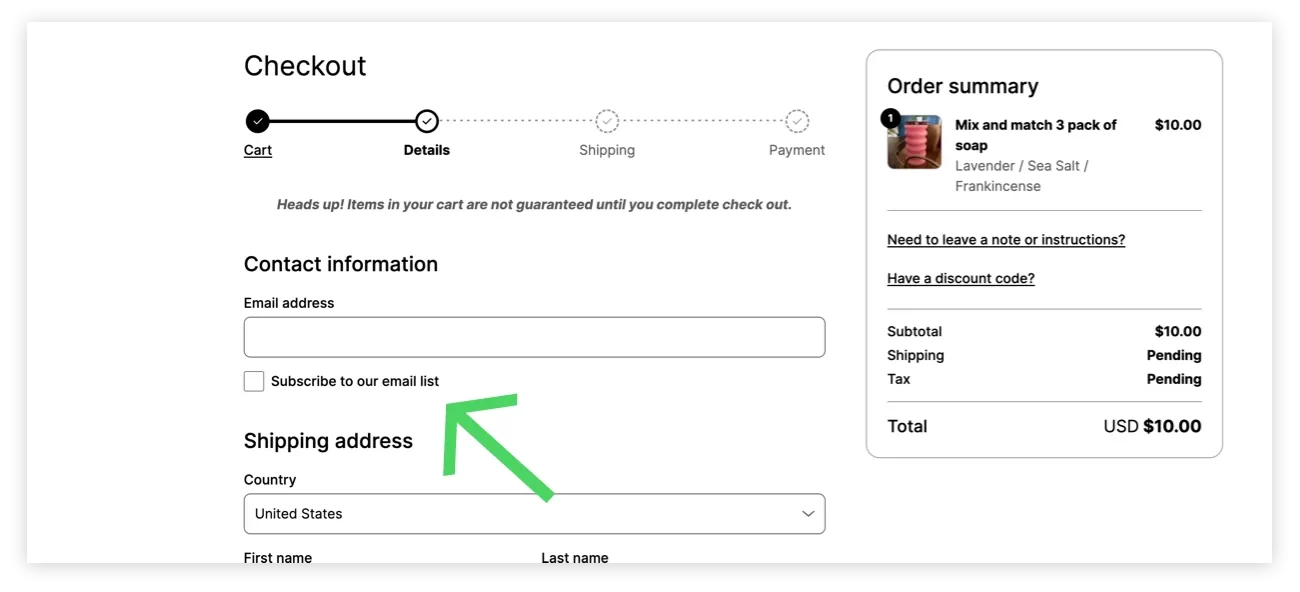
As for blogging, Big Cartel doesn’t include a native blogging feature. However, you can connect your Big Cartel store to a WordPress blog or use third-party plugins to share updates and product stories. It works, but it’s not the most seamless solution.
Etsy marketing features
One standout feature is Etsy Ads, which allow you to promote your products directly in search results. This is particularly useful for reaching buyers who are already searching for items like yours, giving you a quick way to boost visibility without needing to attract external traffic.
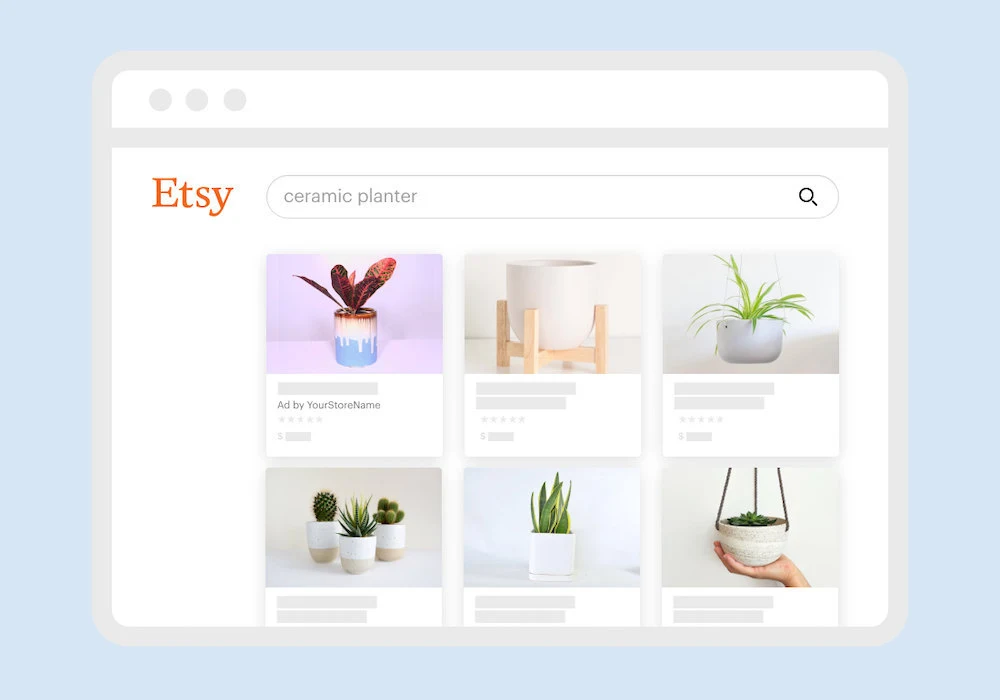
Etsy also makes it simple to share updates about your shop, promotions, or milestones on social media. With integrations to platforms like Facebook, Instagram, Twitter, and Pinterest, you can easily post content that drives traffic back to your store and keeps your audience engaged.
Blogging, however, is more restrictive. The only available option is through Pattern, Etsy’s add-on tool, which enables you to set up a separate website for blogging and additional custom content. While it’s a solution, it doesn’t offer the seamless integration many sellers might prefer.
The Verdict
Etsy edges out Big Cartel in this category. While Big Cartel requires third-party tools to extend its marketing features, Etsy provides built-in solutions that save time and effort. For sellers who value simplicity and integrated options, Etsy has the advantage.
Support & Security (Etsy Wins)
As we wrap up this comparison between Big Cartel vs Etsy, let’s shift our focus to a critical aspect of running an online store—support and security. This final section will explore how Big Cartel vs Etsy ensure your store stays safe and your questions get answered.
Big Cartel support & security
Big Cartel keeps things simple with a small but dedicated team of 10 support agents. They are available via email at [email protected], providing assistance 24/7 on weekdays and from 8 AM to 6 PM EST on weekends.
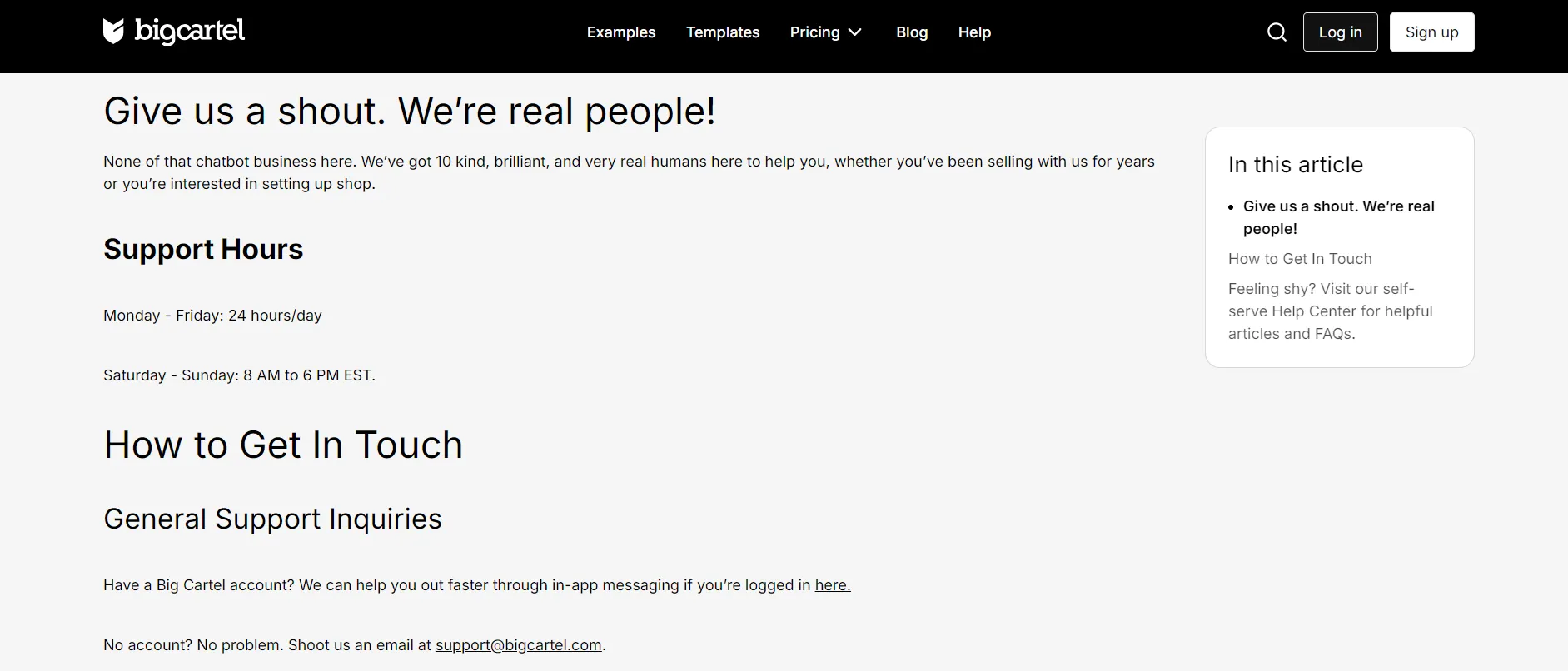
In terms of security, Big Cartel includes a free SSL certificate for all shops and custom domains. Payments are processed securely through PCI-compliant third-party gateways like PayPal and Stripe. However, it’s worth noting that Big Cartel itself is not PCI-compliant, so for enhanced security, integrating with third-party apps is recommended.
Etsy support & security
Etsy provides a well-rounded support system, offering resources like the Help Center, FAQs, guides, and the comprehensive Etsy Seller Handbook. For specific questions, you can rely on email support, live chat, and phone assistance. Although live chat isn't available around the clock, response times are typically quick, making it easy to resolve issues promptly.
On the security front, Etsy implements Transport Layer Security (TLS) encryption to safeguard transactions, ensuring that sensitive data remains protected throughout the process. Additionally, the platform applies Personally Identifiable Information (PII) protocols to enhance user data security further.
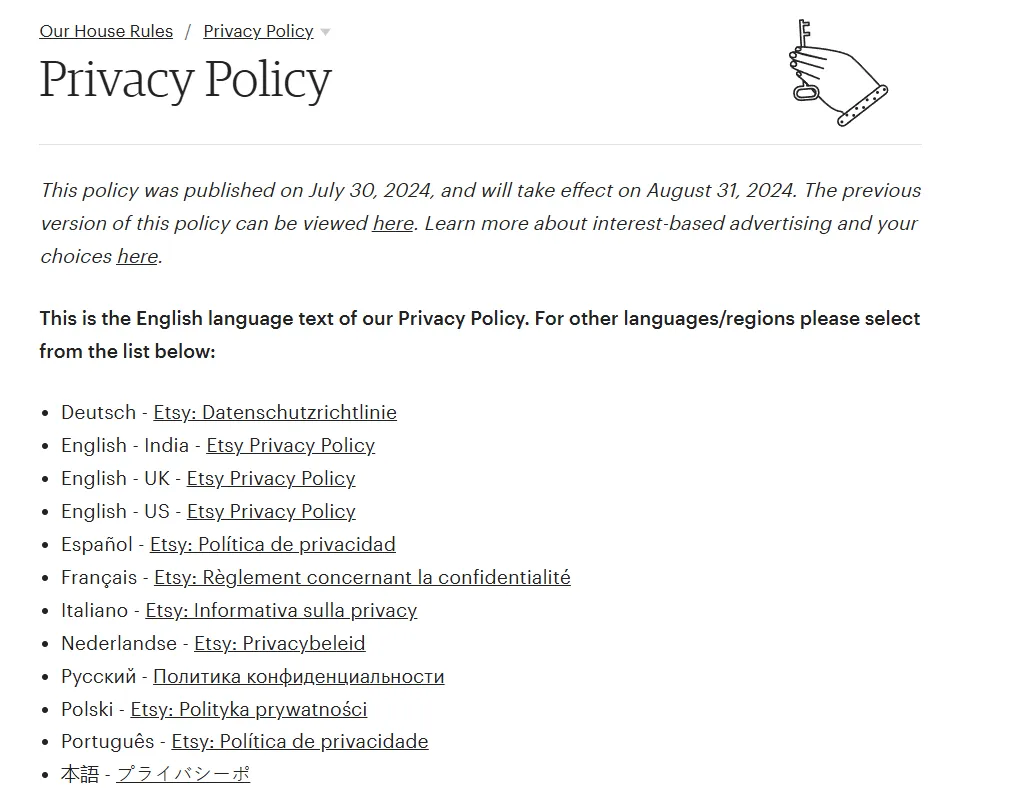
The Verdict
Putting down Big Cartel vs Wix for support and security, Etsy wins this round. Its multiple support channels, including live chat and phone assistance, make resolving issues straightforward. Additionally, robust security measures like TLS encryption and PII protection ensure transactions and data remain secure.
Big Cartel vs Etsy: FAQs
Who is Etsy's biggest competitor?
eBay is one of the biggest alternatives to Etsy, especially when it comes to sellers of unique, handmade, or vintage items. Platforms like Amazon Handmade and Shopify also offer alternatives for creative entrepreneurs.
Does Big Cartel integrate with Etsy?
No, Big Cartel does not offer direct integration with Etsy. You would need to manage your stores separately or rely on third-party apps. We recommend using LitCommerce for seamless product and order synchronization between the two platforms.
What percentage does Big Cartel take?
Big Cartel does not take any commission or percentage of your sales. You only pay for your chosen plan (Free, Platinum, or Diamond), and any transaction fees are handled by payment processors like PayPal or Stripe.
Is Big Cartel worth it?
Yes, Big Cartel is worth it for small businesses, artists, and independent creators looking for an affordable, easy-to-use platform. For more comprehensive insights into its features and limitations, check out our detailed Big Cartel review.
Final Thoughts
Hopefully, you’ve now made up your mind on which platform – Big Cartel vs Etsy – best fits your business needs. Based on our review, Etsy stands out as the better option for most sellers, thanks to its advanced features, built-in audience, and robust tools for scaling your business.
If you want to migrate to Etsy, our LitExtension migration service is here to help. We specialize in secure, automated, and hassle-free migrations, ensuring your store data is transferred accurately with no downtime.
For more insights and comparisons on other eCommerce platforms, check out our LitExtension blog posts or join the community group today!

